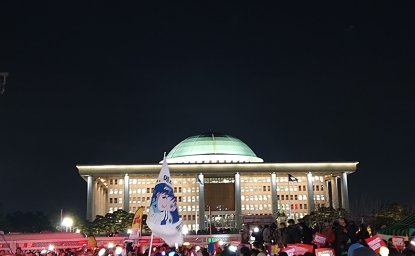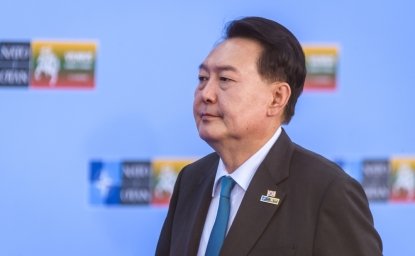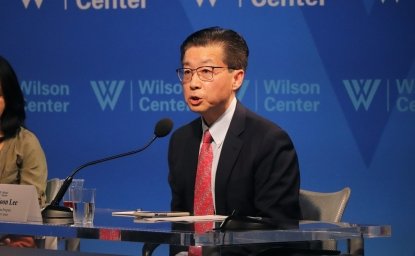
The Wilson Center’s History and Public Policy Program and the University of North Korean Studies, at Kyungnam University, in cooperation with the Wilson Center’s Asia Program/Hyundai Motor-Korea Foundation Center, hosted a workshop this past fall to recognize the collaboration and partnership between the two organizations.
The day consisted of five panels, each with two presenters, followed by discussion among the participants. Opening remarks were delivered by the Wilson Center’s Robert Litwak and Christian F. Ostermann, and Kyungnam’s Ambassador Joun-yung Sun.

The first panel included Sheila Miyoshi Jager (Oberlin College) and Balázs Szalontai (Korea University). Miyoshi Jager discuss the impact of the two king (Kojong & Taewon’gun) problem in the late Joseon Dynasty. She showed that the power struggle between Kojong and Taewon’gun led to conflict between Japan and China on the Korean Peninsula, and that the conflict still reverberates today. Szalontai offered a comprehensive understanding of North Korean history that combined both archival research and media analysis. He argued that propaganda is very useful in order to properly understand primary sources in archives because the media materials of closed countries like the DPRK often reflect its political intentions.
The second panel featured Mina Lee (University of Virginia) and Patrick Chung (University of Maryland College Park). Lee explained that South Korea pursued a nuclear program to ensure its national security, as well as the economic and scientific boosts it would provide. However, the ROK inevitably joined the NPT. Chung illuminated the link between the Vietnam War and the growth of South Korean shipping industry, using the example of the Hanjin Corporation. He argued that the US military played a key role in enabling South Korean corporations to enter the global market during the Cold War era.
 The third panel included Donghyun Woo (UCLA) and Jongdae Shin (Kyungnam University). Woo focused on new sources for the study of history on the Korean Peninsula from the Lenin Library in Moscow. He highlighted the importance of primary sources, creative interpretation, and inspiration from neighboring fields with respect to North Korean studies. Shin described the background and the effect of Kim Il Sung’s visit to Beijing in 1975. He explained that the fall of Saigon created a security concern on the Korean Peninsula, especially in Seoul. To take advantage of this security concern, Kim Il Sung visited China to show off his relationship with Beijing. In response, the US-ROK alliance was strengthened, and ironically, it made North Korea feel threatened.
The third panel included Donghyun Woo (UCLA) and Jongdae Shin (Kyungnam University). Woo focused on new sources for the study of history on the Korean Peninsula from the Lenin Library in Moscow. He highlighted the importance of primary sources, creative interpretation, and inspiration from neighboring fields with respect to North Korean studies. Shin described the background and the effect of Kim Il Sung’s visit to Beijing in 1975. He explained that the fall of Saigon created a security concern on the Korean Peninsula, especially in Seoul. To take advantage of this security concern, Kim Il Sung visited China to show off his relationship with Beijing. In response, the US-ROK alliance was strengthened, and ironically, it made North Korea feel threatened.
The fourth panel featured Benjamin Katzeff Silberstein (University of Pennsylvania) and Thomas Stock (Korea University). Katzeff Silberstein provided an historical overview of North Korea’s surveillance system. He cited several examples, like the Songbun system (discrimination based on family background) and Inminban (Five-Person Responsibility system), to demonstrate the state’s surveillance activities. Stock argued that North Korea’s heterodox ideology deviated from Marxism-Leninism. He found that criticism from the Soviet Union’s loyal partner (East Germany) toward Pyongyang suddenly exploded after 1962, right after the period of Jaryeokgaengsaeng (self-reliance) first appeared in North Korea. He suggested that it was a key turning point the history of North Korea’s political ideology.

The final panel included Shin Yon Kim (Syracuse University) and Kelly Hur (Kyungnam University). Kim outlined the inter-Korean engagement policies of three different ROK regimes. She placed her emphasis on reading context and interplay, along with the leadership style of the regime. Hur dealt with the changes in North Korea’s policies on Korean-Americans during the Cold War era.
The workshop was generously supported by Korean Air, the John D. and Catherine T. MacArthur Foundation, and the Carnegie Corporation of New York.






